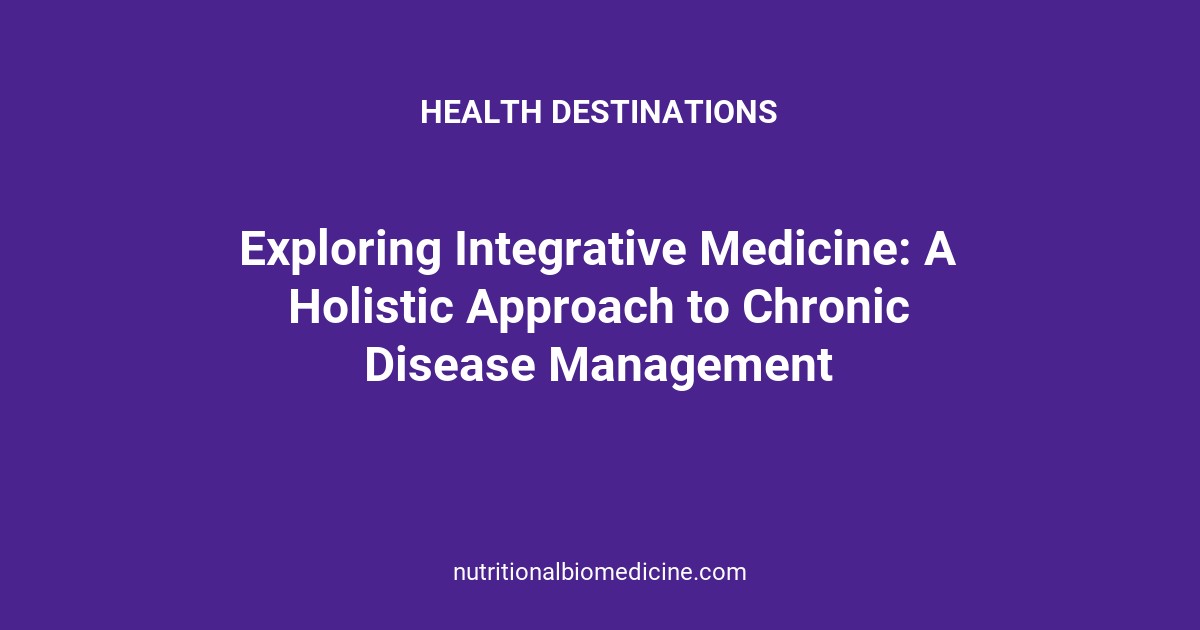
Exploring Integrative Medicine: A Holistic Approach to Chronic Disease Management
Exploring Integrative Medicine: A Holistic Approach to Chronic Disease Management
In the ever-evolving landscape of Healthcare, Integrative Medicine has emerged as a beacon of hope for those grappling with Chronic Diseases. As we advance into 2025, the fusion of conventional medicine with evidence-based complementary therapies is gaining traction worldwide. This holistic approach focuses on treating the whole person—body, mind, and spirit—to promote healing and wellness. Let's delve into the benefits of integrative medicine for Chronic Disease Management, with a spotlight on Nutritional Therapy, mind-body approaches, and [Global Alternative Therapies](http://nutritionalbiomedicine.com/tag/global-alternative-therapies).
Understanding Integrative Medicine in Chronic Disease Management
Integrative medicine is not just about treating symptoms; it's about addressing the root causes of chronic diseases. By combining conventional medical treatments with alternative therapies, integrative medicine offers a personalized, patient-centered approach. This method is particularly effective for managing complex conditions like diabetes, heart disease, and autoimmune disorders, which often require multifaceted interventions.
In 2025, the trend towards integrative medicine is driven by a growing body of research supporting its efficacy. Functional medicine, a key component of integrative medicine, focuses on understanding the biological systems and how they interact with the environment and genetics. This approach helps healthcare providers tailor treatments to each patient's unique needs, leading to better outcomes and improved quality of life.
The Role of Nutritional Therapy in Chronic Disease
Nutritional therapy is a cornerstone of integrative medicine, recognizing that food is medicine. Chronic diseases often stem from underlying issues like Inflammation, oxidative stress, and nutrient deficiencies. By addressing these issues through a Balanced Diet, nutritional therapy can significantly improve health outcomes.
In 2025, [Personalized Nutrition](http://nutritionalbiomedicine.com/tag/personalized-nutrition) plans are becoming increasingly sophisticated, thanks to advancements in <a href="https://nutritionalbiomedicine.com/nutritional-biomedicine-and-Fertility-boosting-conception-rates-through-integrative-medicine-AxfkCF" title=""Nutritional Biomedicine and Fertility: Boosting Conception Rates through Integrative Medicine"">Nutritional biomedicine. Healthcare providers now use genetic testing, microbiome analysis, and other diagnostic tools to create tailored dietary recommendations. For instance, a diet rich in anti-inflammatory foods like leafy greens, fatty fish, and turmeric can help manage conditions like arthritis and inflammatory bowel disease.
Mind-Body Approaches for Holistic Wellness
Mind-body approaches are integral to integrative medicine, acknowledging the profound connection between mental and physical health. Techniques like meditation, yoga, and mindfulness have been shown to reduce stress, improve mood, and enhance overall well-being.
In 2025, mind-body therapies are being increasingly integrated into mainstream healthcare. For example, mindfulness-based stress reduction (MBSR) programs are widely used to help patients manage chronic pain, anxiety, and depression. These practices not only improve mental health but also positively impact physical conditions by reducing inflammation and boosting immune function.
Global Perspectives on Alternative Therapies for Chronic Diseases
Integrative medicine draws from a rich tapestry of global healing traditions, offering a diverse toolkit for managing chronic diseases. From Traditional Chinese Medicine (TCM) to Ayurveda and Native American healing practices, these alternative therapies provide valuable insights into Holistic Wellness.
In 2025, Medical Tourism is on the rise, with patients traveling to destinations like India, China, and Thailand to access traditional healing practices. For instance, Ayurvedic treatments like Panchakarma detoxification and herbal remedies are gaining popularity for managing conditions like diabetes and digestive disorders. Similarly, acupuncture and herbal medicine from TCM are widely used to treat chronic pain and autoimmune diseases.
Case Studies: Success Stories in Integrative Medicine
Real-life success stories highlight the transformative power of integrative medicine. For example, a patient with severe rheumatoid arthritis found relief through a combination of anti-inflammatory diet, acupuncture, and mindfulness practices. Another patient with type 2 diabetes achieved significant improvements in blood sugar levels through personalized nutrition and stress reduction techniques.
These case studies underscore the effectiveness of integrative medicine in chronic disease management. By addressing the whole person, integrative medicine offers a comprehensive, sustainable path to wellness.
Conclusion
Integrative medicine represents a paradigm shift in chronic disease management, offering a holistic approach that combines the best of conventional and alternative therapies. In 2025, the trends in nutritional therapy, mind-body approaches, and global alternative therapies are paving the way for a more personalized, effective healthcare model. By embracing integrative medicine, patients can achieve better health outcomes and enjoy a higher quality of life.
For more insights into the latest developments in integrative medicine and nutritional biomedicine, explore our blog and resources. Stay informed and take control of your health journey today.
Frequently Asked Questions

nutritionalbiomedicine.com
No bio available.

